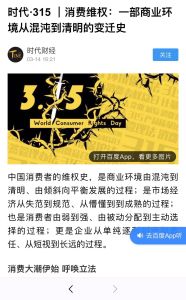
Read or listen offline
Amazon KindleRecommendation
In China, March 15 – World Consumer Rights Day – gets immense press coverage and attention. People in China use the day – a mere sidenote elsewhere in the world – as an opportunity to air their grievances. The day’s highlight is a television gala during which the government takes fake goods off the market, highlights unfair business practices and calls attention to scams it uncovered during the previous year. The gala is the government’s propagandistic effort to communicate its dedication to protecting its people, but China has indeed come a long way in terms of consumer rights. In this article published by Time Finance, an online media platform covering business, economics and investment trends, writer Wang Ying tracks the history of China’s consumer rights, including interesting examples and sound analysis. This offers an engaging read for anyone curious about how consumer rights evolved alongside China’s economy. Interestingly, this well-meaning look back at China’s history of consumer rights laws was censored days after the article was published – likely because it mentions public demonstrations and recounts the rampant business fraud of the past.
Summary
About the Author
Wang Ying writes for Time Finance, an online financial news media platform headquartered in Guangzhou, China. She reports on corporate news and investment trends.

















Comment on this summary